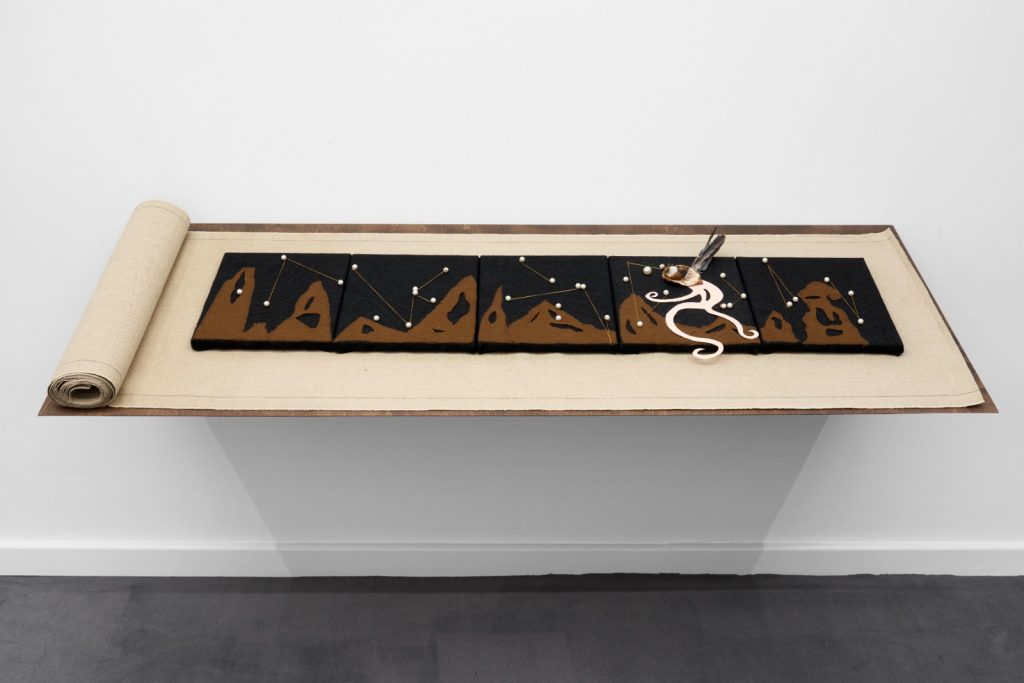News

Denver Art Museum acquires “Isabel (in the Warmi Pachakuti)” by Andrés Pereira Paz
12.07.2023
Isabel (in the Warmi Pachakuti), 2021
Brunand Brunand Gallery, Berlin
In Isabel (in the Warmi Pachakuti), Andrés Pereira Paz takes as a starting point the life stories of the women in his family – a matriarchy in which the name Isabel has been inherited for three generations – to propose a constellation of four works that reflect upon the life-sustaining labor that in the context of the pandemic has been placed at the center of public debate.
Although since the Sixties feminism has shown that the most important subsidy of capitalism is the reproductive labor performed by millions of women from their homes, it was not until the present global health crisis that an awareness of its centrality spread widely. Today, as we confront death from an unpredictable virus amidst collapsed health systems as a result of decades of neoliberal austerity policies, it is essential to recognize the deep implications of life on Earth and the need to turn care work into a collective project.
In a recent conference entitled Resistances, insurgencies and struggles for life in times of extermination, the Bolivian feminist theorist and activist Silvia Rivera Cusicanqui highlighted the importance of the efforts made by women to mitigate the deadly effects of the patriarchal capitalist system. From pregnancy to breastfeeding, to caring for children and the elderly, among other labors mediated by love, women dedicate their bodies to the preservation of life on a daily basis. According to Rivera Cusicanqui, this historical experience in addition to the moral ruin of the economic system that was recently revealed by the pandemic, set the conditions for the arrival of what in the Andean world is known as a Warmi Pachakuti. This is an ethical and epistemic turn towards the feminine, which puts women and other feminized bodies in the first line of thought and action in the plight to overcome both present and future crisis.
Rivera Cusicanqui’s reflections form the backbone of Andrés’ project. In Isabel (in the Warmi Pachakuti) the artist vindicates the natural, the domestic and the biographical as spaces from which speaking out becomes more vital and effective than ever. We are trapped in an inescapable web of reciprocity. The virus has shown that the boundaries of our individuality are porous, that our own health depends on the health of all. The recognition of this physiological interdependence challenges the ideal of Western individualism which is reinforced by the neoliberal economy, highlighting the urgency of creating communities based on caring. From ritualistic and emotional perspectives rather than purely rational, in Isabel (in the Warmi Pachakuti), Andrés exposes this situation, paying tribute to the long history of women placing life at the center and claiming it as a pillar of the political imagination to come.
Florencia Portocarrero
May 2021
Brunand Brunand Gallery, Berlin
In Isabel (in the Warmi Pachakuti), Andrés Pereira Paz takes as a starting point the life stories of the women in his family – a matriarchy in which the name Isabel has been inherited for three generations – to propose a constellation of four works that reflect upon the life-sustaining labor that in the context of the pandemic has been placed at the center of public debate.
Although since the Sixties feminism has shown that the most important subsidy of capitalism is the reproductive labor performed by millions of women from their homes, it was not until the present global health crisis that an awareness of its centrality spread widely. Today, as we confront death from an unpredictable virus amidst collapsed health systems as a result of decades of neoliberal austerity policies, it is essential to recognize the deep implications of life on Earth and the need to turn care work into a collective project.
In a recent conference entitled Resistances, insurgencies and struggles for life in times of extermination, the Bolivian feminist theorist and activist Silvia Rivera Cusicanqui highlighted the importance of the efforts made by women to mitigate the deadly effects of the patriarchal capitalist system. From pregnancy to breastfeeding, to caring for children and the elderly, among other labors mediated by love, women dedicate their bodies to the preservation of life on a daily basis. According to Rivera Cusicanqui, this historical experience in addition to the moral ruin of the economic system that was recently revealed by the pandemic, set the conditions for the arrival of what in the Andean world is known as a Warmi Pachakuti. This is an ethical and epistemic turn towards the feminine, which puts women and other feminized bodies in the first line of thought and action in the plight to overcome both present and future crisis.
Rivera Cusicanqui’s reflections form the backbone of Andrés’ project. In Isabel (in the Warmi Pachakuti) the artist vindicates the natural, the domestic and the biographical as spaces from which speaking out becomes more vital and effective than ever. We are trapped in an inescapable web of reciprocity. The virus has shown that the boundaries of our individuality are porous, that our own health depends on the health of all. The recognition of this physiological interdependence challenges the ideal of Western individualism which is reinforced by the neoliberal economy, highlighting the urgency of creating communities based on caring. From ritualistic and emotional perspectives rather than purely rational, in Isabel (in the Warmi Pachakuti), Andrés exposes this situation, paying tribute to the long history of women placing life at the center and claiming it as a pillar of the political imagination to come.
Florencia Portocarrero
May 2021